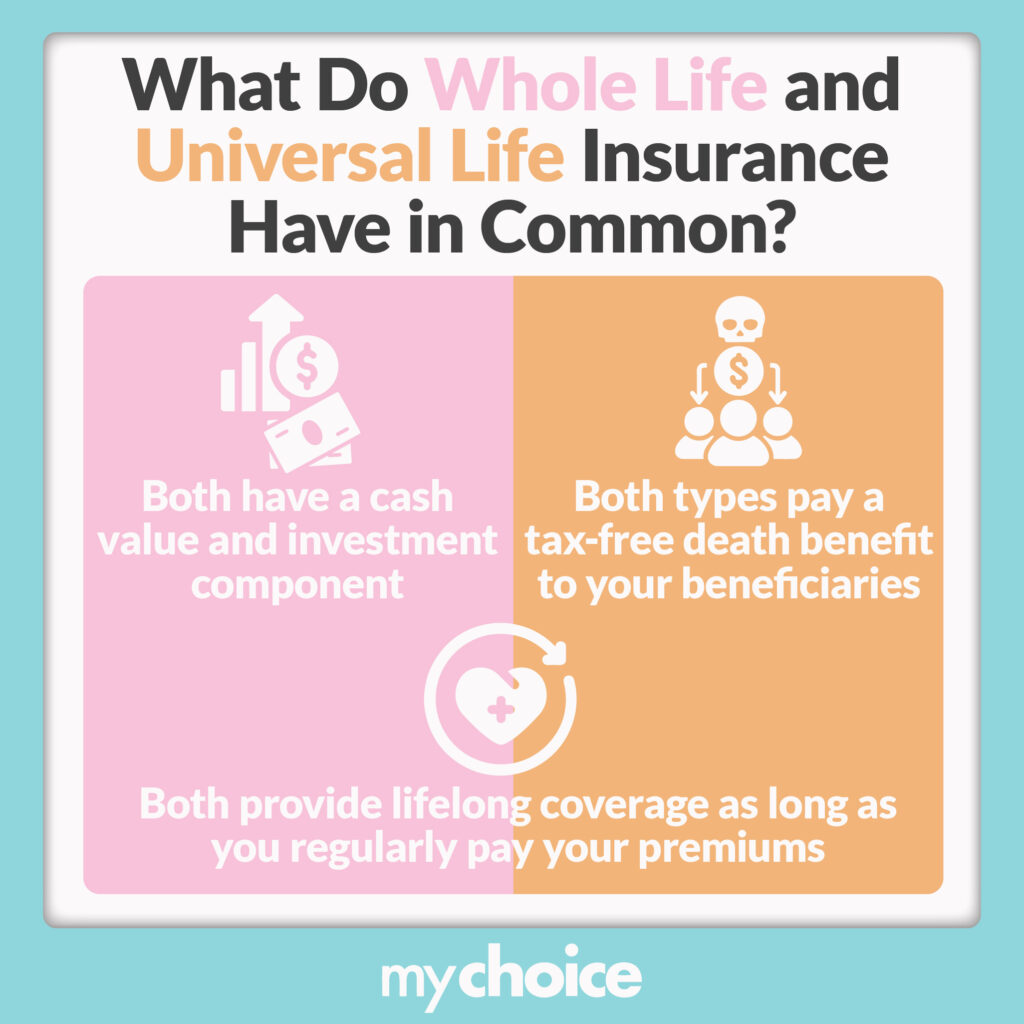
When choosing life insurance, it’s important to take your needs and financial plans into consideration. Depending on your budget, appetite for investment risk, and desired future opportunities, you may prefer to get whole or universal life insurance.
What’s the difference between universal life and whole life insurance policies, and which one is right for you? Read on to find out the pros and cons of each before choosing a policy type. You can also learn more about life insurance’s various benefits in our guide to why life insurance is important.
What Is Whole Life Insurance?
Whole life insurance is a type of permanent life insurance that covers you until your death. As long as you regularly pay your insurance premiums, you can accumulate a cash value for your policy and guarantee tax-free death benefits for your policy beneficiaries.
With this policy type, your insurance premiums are set from the very beginning according to your policy’s terms. These premiums remain the same for the duration of your policy. Even if you miss a payment, you can still be covered as long as you have enough accumulated cash value to answer for the cost.
If whole life insurance and other forms of permanent life insurance are too costly, term life insurance may be a sounder financial option.
What Is Universal Life Insurance?
Universal life insurance is also a form of permanent life insurance where part of the policyholder’s premiums are used to provide lifelong coverage and a tax-free benefit. However, a portion is also placed in an investment account.
Typically, the policyholder can pick from various investment options presented by the insurance company, each with varying levels of risk and return. These are the three common types of universal life insurance policies:
- Guaranteed universal life insurance (GUL): GULs have both a guaranteed death benefit and premium levels, so these will remain the same throughout the duration of the policy. Usually, you get to pick when the policy’s coverage ends, such as age 70, 90, or even 100. While GULs don’t build much cash value, they’re typically more affordable than other forms of life insurance. Note that because there’s very little cash value that can cover missed premium payments, even one missed payment may cause your policy to lapse.
- Indexed universal life insurance (IUL): IULs allow you to lower or increase your death benefit and premiums within set limits while providing lifetime coverage. This policy type’s investment aspect is typically connected to a stock market’s index, with a maximum and minimum guaranteed rate of return.
- Variable universal life insurance (VUL): VUL policies allow you to adjust your insurance premiums and choose the sub-accounts that will contribute to your policy cash value’s growth. If you’re lucky or invest wisely, you can enjoy above-average returns. But if your investments don’t go according to plan, your policy’s cash value may be wiped out.
What Is Permanent Life Insurance?
Now we understand that both whole and life insurance are a type of permanent life insurance lets take a look at what that is in a little more detail.
Permanent life insurance is a type of life insurance policy that covers you throughout your entire lifetime. If you pass away at any time while your policy is in effect, your policy’s beneficiaries will receive payment. This life insurance type can be classified primarily into two types: universal life insurance and whole life insurance.
This type of life insurance builds cash value, so if you cancel your policy, you get that cash value less the amount that you already paid in premiums. Permanent life insurance policies may be used as collateral for loans, and you can even take out a policy loan.
Note that if you borrow using your policy’s cash value and don’t repay the loan, this will reduce the amount that your beneficiaries will receive.
Universal Life vs Whole Life Insurance: What’s the Difference?
We know that universal life insurance and whole insurance are both a form of permanent life insurance from our sections above. Here’s a quick summary that allows you to compare some key differences of each life insurance type other at a moment’s glance:
| Universal life insurance | Whole life insurance | |
| Coverage period | Lifetime | Lifetime |
| Best for | Greater flexibility in premium rates, investment opportunities, or potential investment returns depending on the type chosen | Long-term financial plans like retirement funds, mitigating funeral costs, and estate planning |
| Guaranteed level premiums | Can be lower or higher at different times depending on the policy’s terms | Entire life |
| Cost | Lower | Higher |
| Benefits | Death benefit and potentially higher cash value | Consistent death benefit and cash value |
| Coverage after non-payment | Can continue if there’s still enough cash value remaining in the policy to pay for premiums | Can continue if there’s still enough cash value remaining in the policy to pay for premiums |
What Do Whole Life and Universal Life Insurance Have in Common?
There are several elements that whole life insurance and universal life insurance have in common, such as:
- Both have a cash value and investment component. These components can be used for policy loans or as collateral against loans.
- Both types pay a tax-free death benefit to your beneficiaries.
- Both of these policies are a form of permanent life insurance, providing lifelong coverage as long as you continue to regularly pay your premiums.
How Does Whole Life Insurance Work?
When applying for whole life insurance, your premiums are determined by the same factors as when you apply for other forms of permanent life insurance, such as age, health, and lifestyle. Some providers may ask you to undergo a medical examination.
Upon approval of your policy, you’ll be responsible for paying your policy premiums annually, monthly, or quarterly, depending on the terms of your policy. Part of your premiums are used for keeping the policy active and covering administrative fees. Another portion is used by your life insurance company for investing – this amount is the cash value of your policy.
Under whole life insurance, your policy’s cash value increases with a fixed interest rate. You will have access to the cash value during your lifetime. If you cancel your whole life insurance policy, you can receive your policy’s cash surrender value less any surrender charges.
When to Get Whole Life Insurance
Whole life insurance can be more costly than universal life insurance, but if you prefer to have lifetime coverage while investing elsewhere for higher returns, this may be the policy type for you. Because their policy premiums are set, you don’t have to worry about having to pay a higher rate later on.
The accumulated cash value is also an attractive benefit for those who want to plan for financial emergencies like a retirement nest egg or estate planning. For those who prefer to be hands-off when it comes to investing, this coverage may be most suitable.
How Does Universal Life Insurance Work?
Generally, applying for universal life insurance appears similar to applying for other permanent life insurance policies. Under this coverage type, your minimum premiums are determined by your life insurance provider depending on the same factors, like the amount of coverage, lifestyle, age, and pre-existing health conditions.
Under universal life insurance, your beneficiaries will receive a single tax-free death benefit payment upon your death. To keep your universal life insurance policy active, you need to pay your premiums on time and under the conditions of your policy.
Note that, unlike with whole life insurance, you can decide how much you want to pay into a universal life insurance policy’s cash value. This means that you may use your policy as part of your investment planning. You can treat the policy as an account where the remaining balance is invested and used to earn tax-deferred interest.
When to Get Universal Life Insurance
For those who want to be a little more hands-on with their policies and aggressive in investments, universal life insurance combines the possibility of higher returns with lifetime coverage. Universal life insurance offers a potentially greater cash value, provided you’re also willing to take on a little more risk.
This coverage type is also best for those who want more flexibility in the timing and rates of their insurance premiums. This allows policyholders to keep their coverage while adapting to changes in their financial situation and needs.
Note that universal life insurance also comes in different types, so talk to an insurance agent to find out more about which types they offer to determine which subtype is the right fit for you.

Does Whole Life Insurance or Universal Life Insurance Give a Greater Cash Value?
Which insurance type gives a greater cash value depends on the market and your premium payments.
Universal life insurance policies accumulate cash value based on the performance of investments and how much you put into your investment account. Because market conditions and prevailing interest rates can make this policy type’s returns bigger or smaller, it has a bigger potential for high returns as well as a higher risk of low or even no returns.
Whole life insurance policies, on the other hand, have generally predictable growth for your cash value. Whenever you pay your annual, monthly, or quarterly premiums, part of that is added to your policy’s cash value – guaranteeing a certain amount of growth.
Generally, which policy type will generate a bigger cash value for you depends on prevailing market conditions and your risk appetite. If the economy is strong, universal life insurance tends to have higher returns.
However, in a weaker market, returns are unstable. It may be better for risk-averse policyholders to get whole life insurance instead.
Is Universal Life Insurance Generally Cheaper Than Whole Life Insurance?
Generally, universal life insurance is cheaper than whole life insurance. That said, life insurance costs depend on several factors, such as lifestyle, sex, age, and health. The cost of universal life insurance is also still up to you, as policyholders can choose to pay more to increase the cash value of their policies.
Which Insurance Type Is Best for Me?
There’s no one-size-fits-all insurance policy for everyone. When choosing insurance coverage, it’s key to keep certain considerations in mind such as your needs, budget, and future financial plans.
If you have a moderate appetite for risk and want to dip your toes into investments, universal life insurance may be the policy type for you. Ask your insurance company what investment options they offer if you’re interested in getting this type of policy.
If you’d prefer to seek investment opportunities elsewhere and get a higher rate of return, or simply prefer to avoid investment risks, the straightforward simplicity of whole life insurance may be best for you.
Many insurance providers in Canada provide both whole and universal life insurance policies, so use MyChoice to compare insurance quotes and find the best option for you.
The Bottom Line
Universal life insurance and whole life insurance have their respective benefits and drawbacks in terms of opportunity costs, flexibility, and investment opportunities. When choosing one or the other, it’s important to take your needs and financial plans for your loved ones into consideration. With the right coverage, you can enjoy peace of mind knowing that you’ve invested your money wisely while providing for your family’s future.








